MBA holders demand emerging tech education
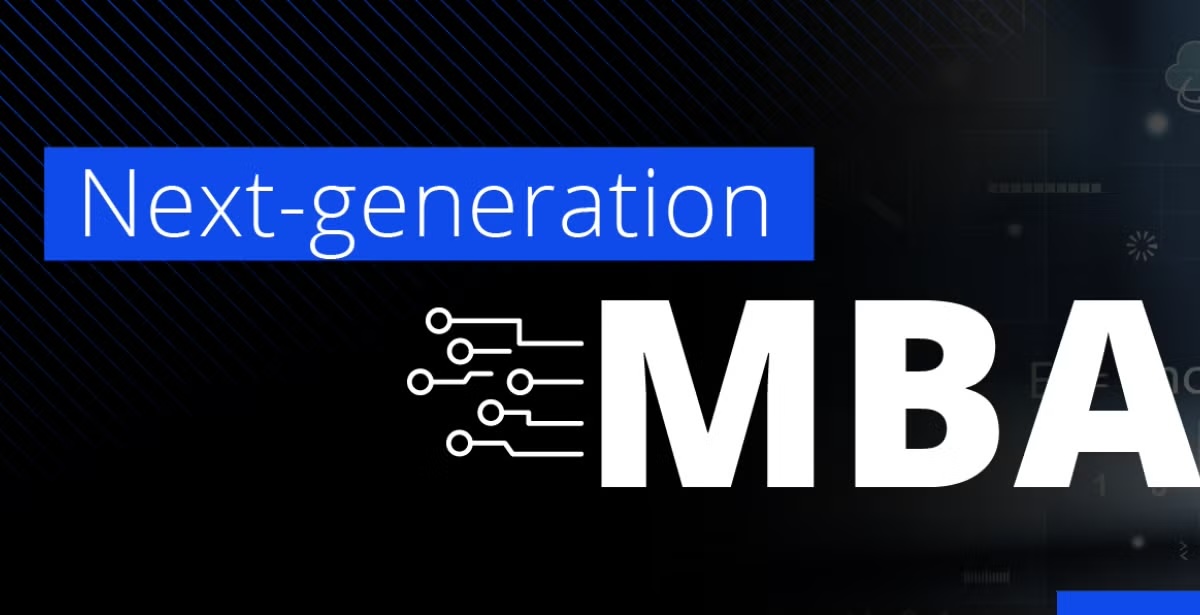
Key takeaways
- AI will have the biggest impact on businesses in the next 5-10 years, according to 86% of MBA holders.
- 76% of MBA holders consider knowing how to use ChatGPT crucial in today's job market, and 50% currently use this chatbot at work.
- 2 in 3 MBA holders said they wish they could have studied a hypothetical concentration generated by ChatGPT when earning their degree.
- Overall, 55% of MBA holders said MBA concentrations generated by ChatGPT would have helped them prepare for their current job.
Revolutionising MBA programs
Artificial intelligence and other advanced technologies are transforming the workplace, eliminating millions of jobs while creating millions more. As emerging technologies change the business landscape, how will Master of Business Administration (MBA) and similar programs, such as the Master of Technology Management (MTM), adapt curricula to stay relevant in this new industrial revolution?
For this study, we surveyed MBA program professors, business school department workers, and emerging technologies experts to determine what changes these programs need to make to keep pace and what future MBA programs might look like. To take the study even further, we used ChatGPT to generate hypothetical MBA concentrations and surveyed 501 MBA holders about the results. Let's explore the exciting future possibilities for these innovative degrees.
Emerging technology education in MBA programs
Before looking into the future of MBA programs, we wanted to see how well current programs prepare graduates to work with emerging technologies. Do MBA holders feel their degree has helped them tackle technology in the workplace, or are they struggling to keep up?
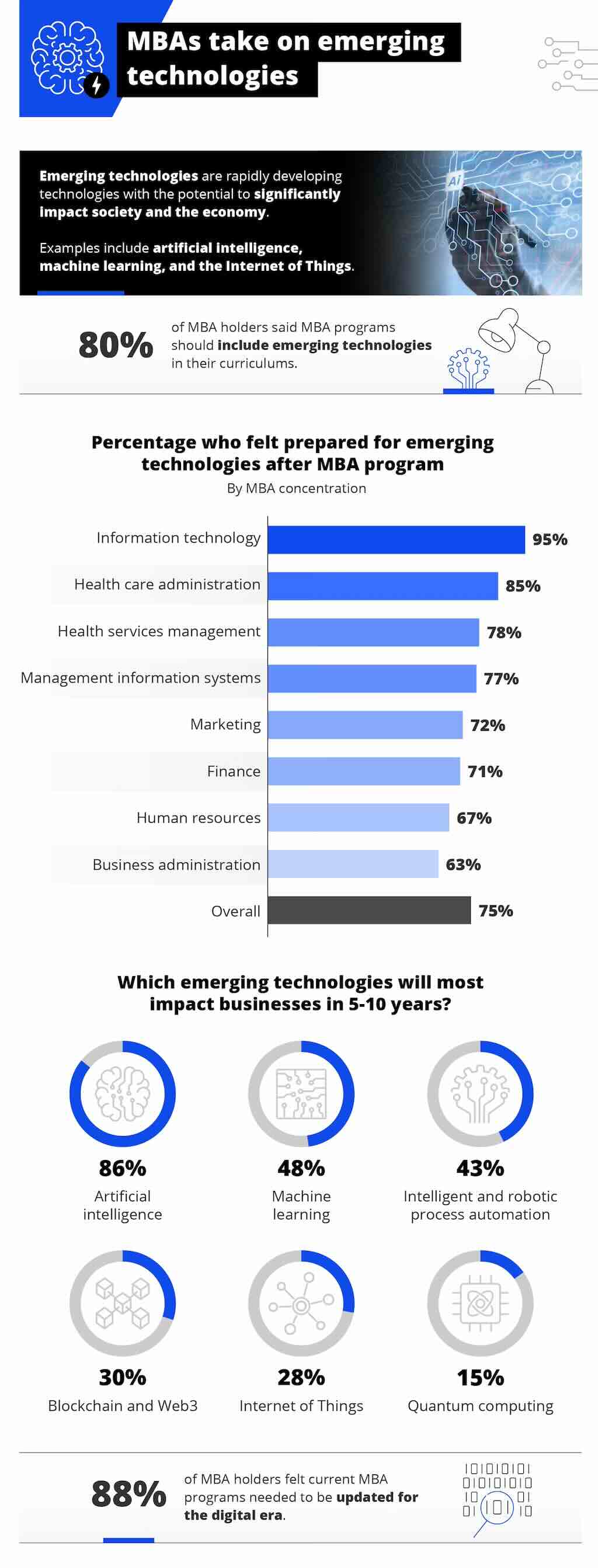
Overall, 75% of MBA holders felt their degree program prepared them to work with emerging technologies, but some concentrations prepared graduates better than others. The vast majority of those with concentrations in information technology and health care administration felt very prepared to work with emerging technologies, but MBAs with concentrations in human resources and business administration felt far less so.
That said, even technology-prepared MBAs felt there was room for improvement; 88% of MBA holders said current programs needed updating for the digital era. Of all the emerging technologies relevant to MBA programs, 86% of MBAs said artificial intelligence (AI) would have the most significant impact on business over the next five to 10 years. It may not even take that long: AI is already upending how industries and consumers interact, from self-driving delivery cars to cutting-edge customer service chatbots.
Skills needed to succeed
However well-versed or ill-prepared they might feel for emerging technologies, MBA holders recognize that certain AI technologies are particularly critical for succeeding in the modern workplace.
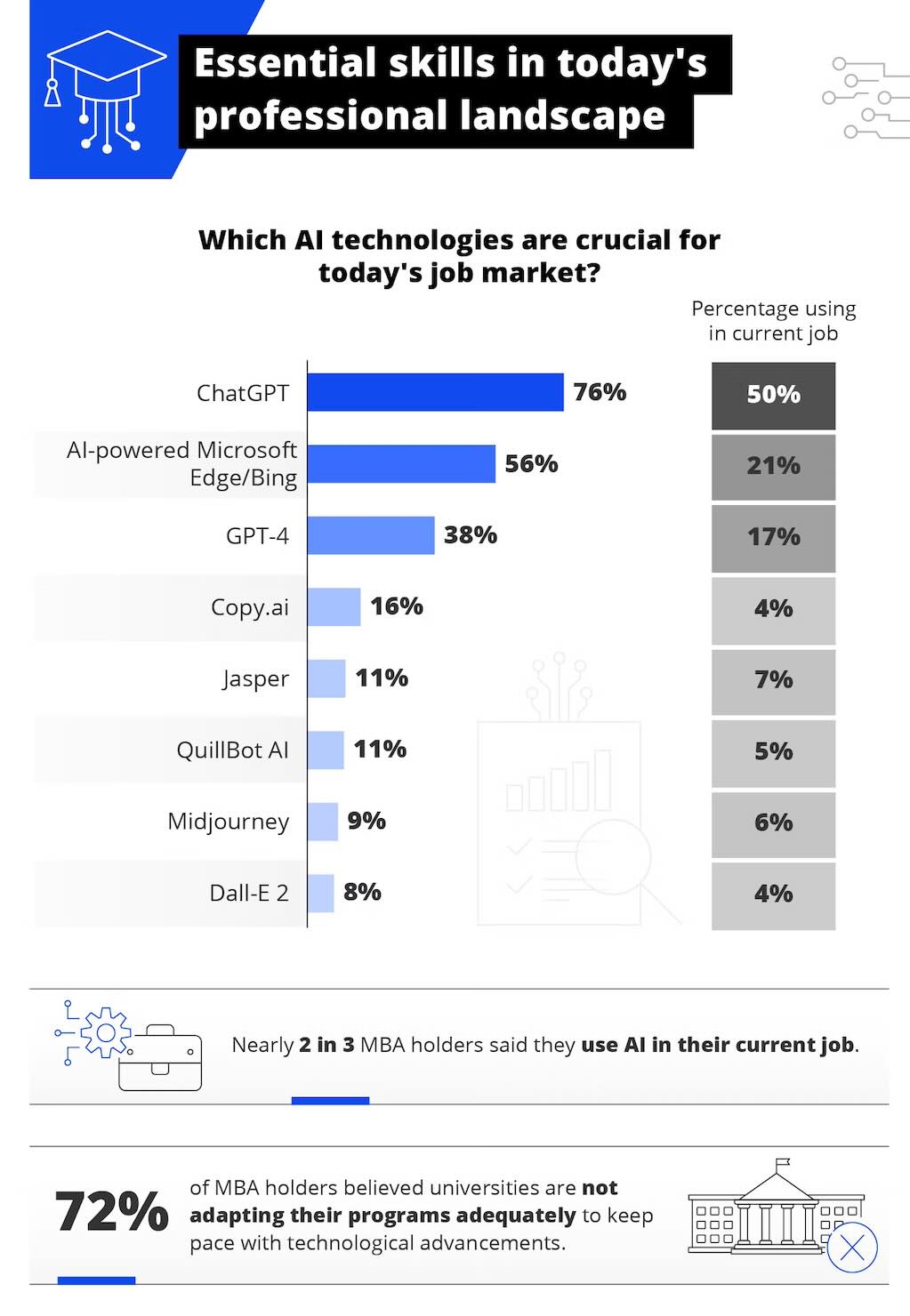
Roughly 66% of MBA holders reported using AI technologies in their current job, the most common of which was ChatGPT. One of the fastest developing technologies available, OpenAI's ChatGPT is quickly expanding into every corner of the business world. Our survey found that 76% of those with MBAs believed knowing how to use ChatGPT was essential in today's job market, and 50% already used it at work.
Microsoft's new Edge and Bing (powered with OpenAI technology) were other essentials for MBA holders, with 21% already using it for their job. Despite the prevalence of AI in the workplace, 72% of MBA holders said universities aren't sufficiently updating their MBA programs to keep pace with technology. That could prove problematic for graduates—and the companies that hire them—down the road.
MBA holders weigh in on ChatGPT's innovations
If MBA programs aren't doing enough to keep up with technological advancements, how can they adapt to do so? We consulted various experts and conducted online research to identify the biggest trends and objectives for technology-focused MBA programs. We then prompted ChatGPT to generate MBA concentrations that would bring current programs into the future.
To determine the validity of ChatGPT's concentrations, we surveyed 501 MBA holders about the concentrations and their potential usefulness in MBA programs—without telling them the programs were AI-generated. Can AI technology successfully create curricula about AI technology? Let's find out.
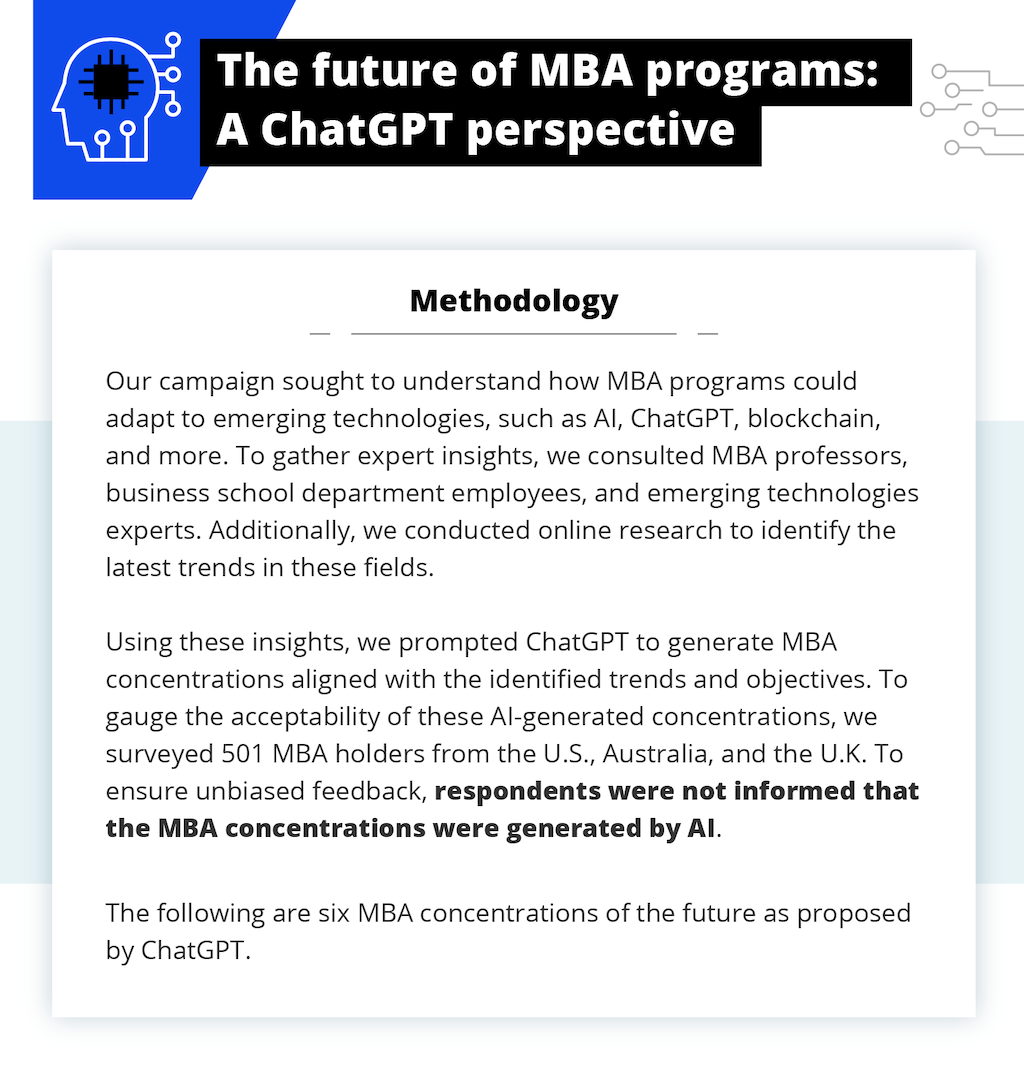
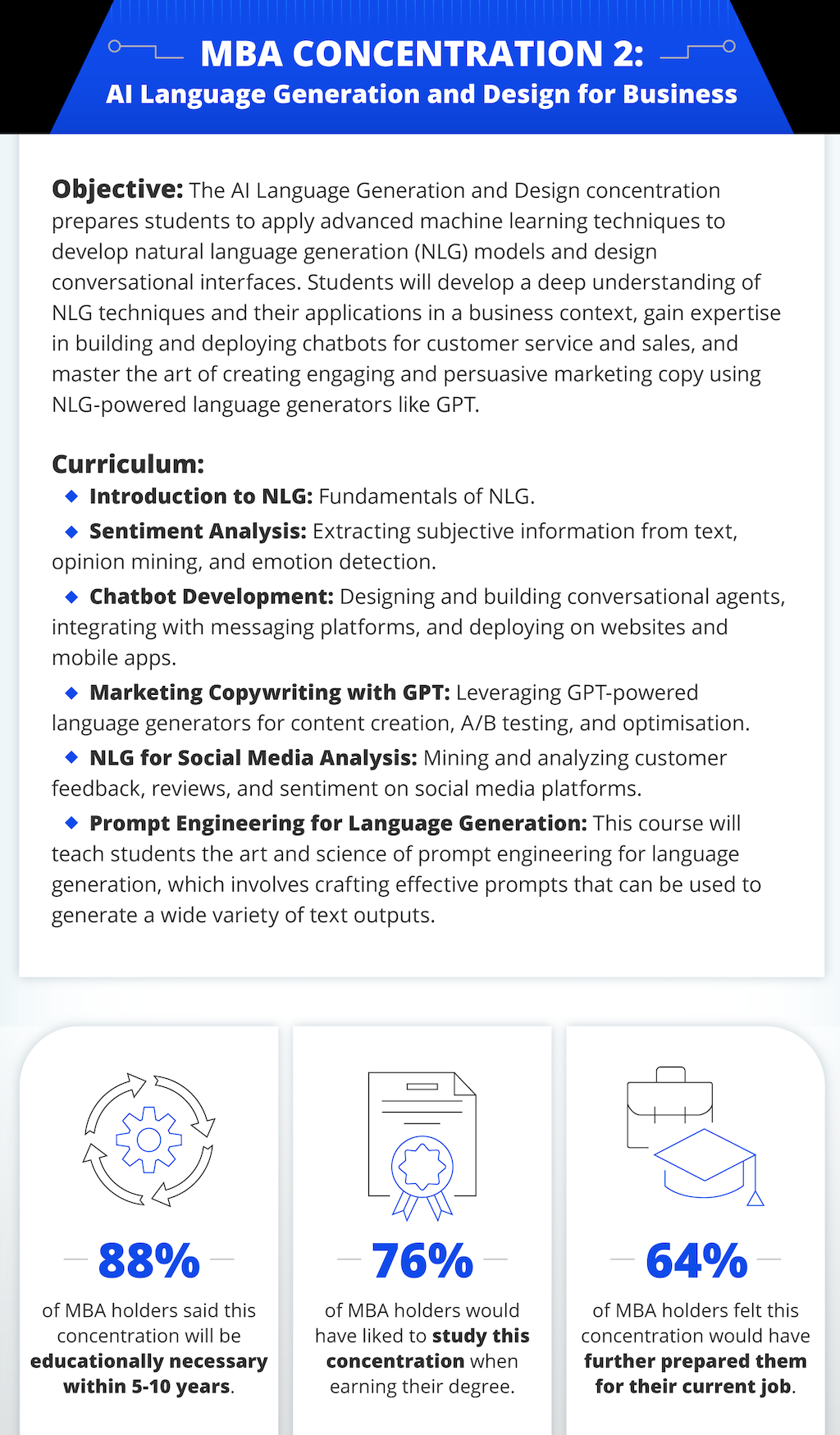
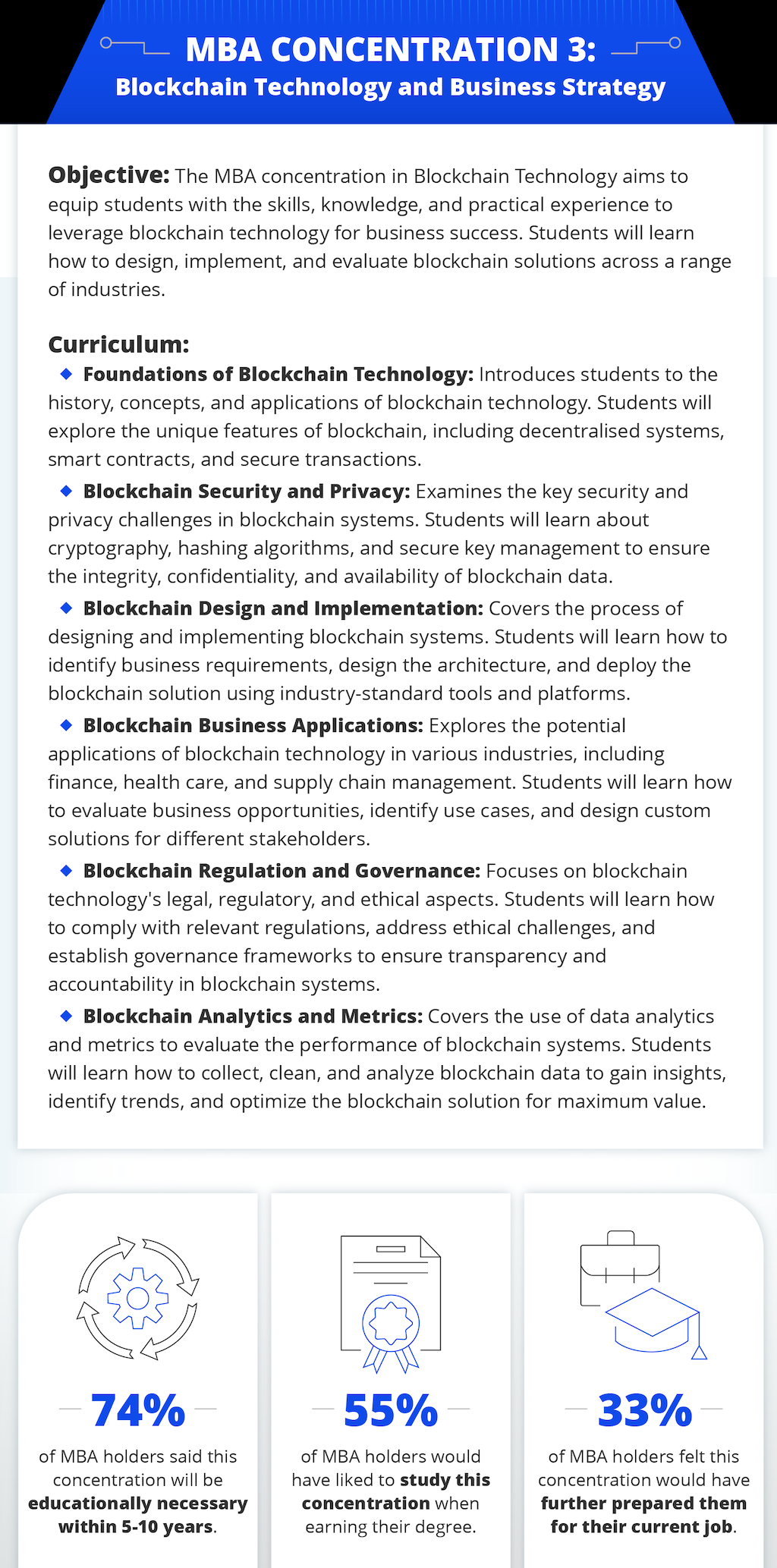
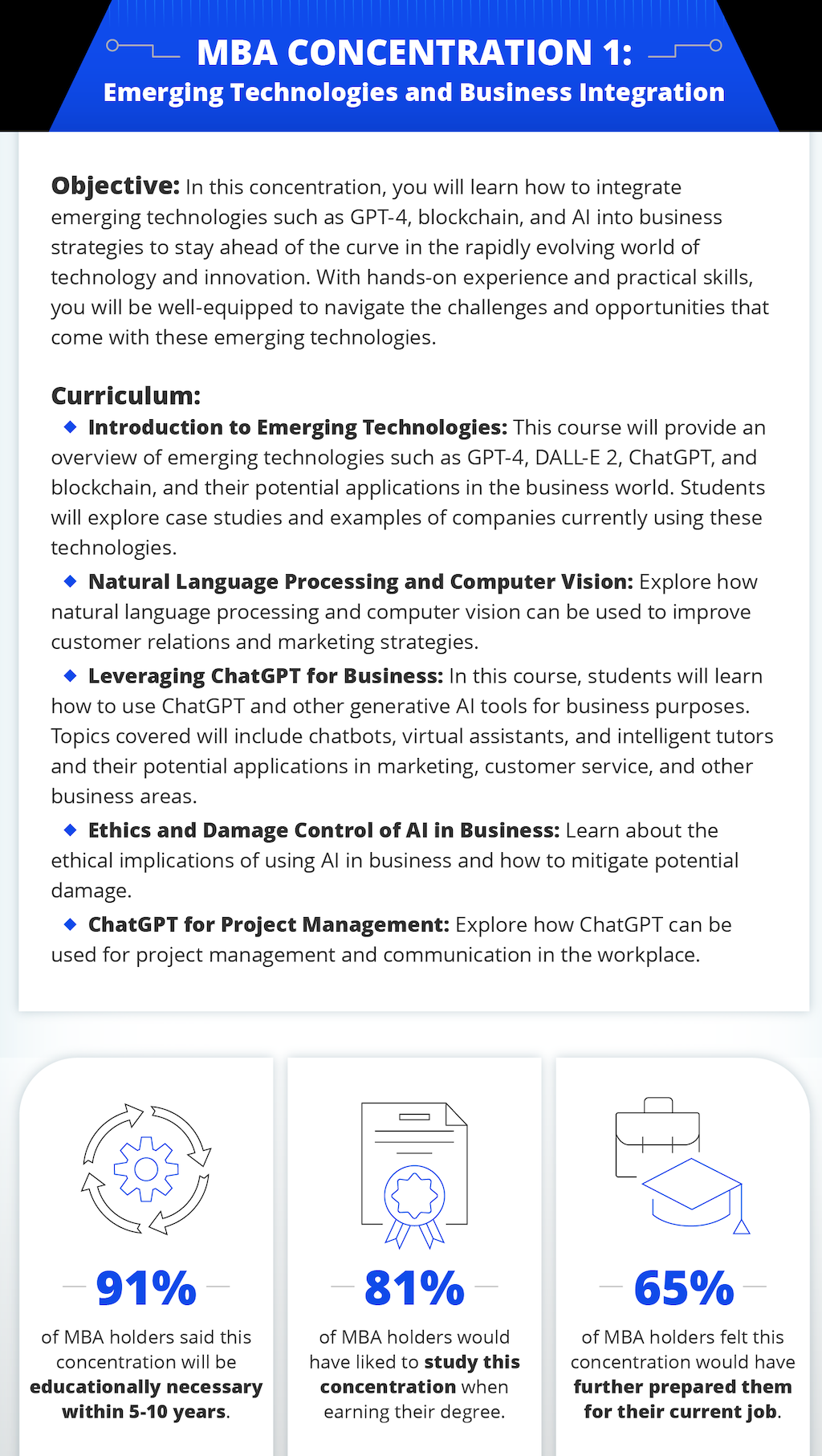
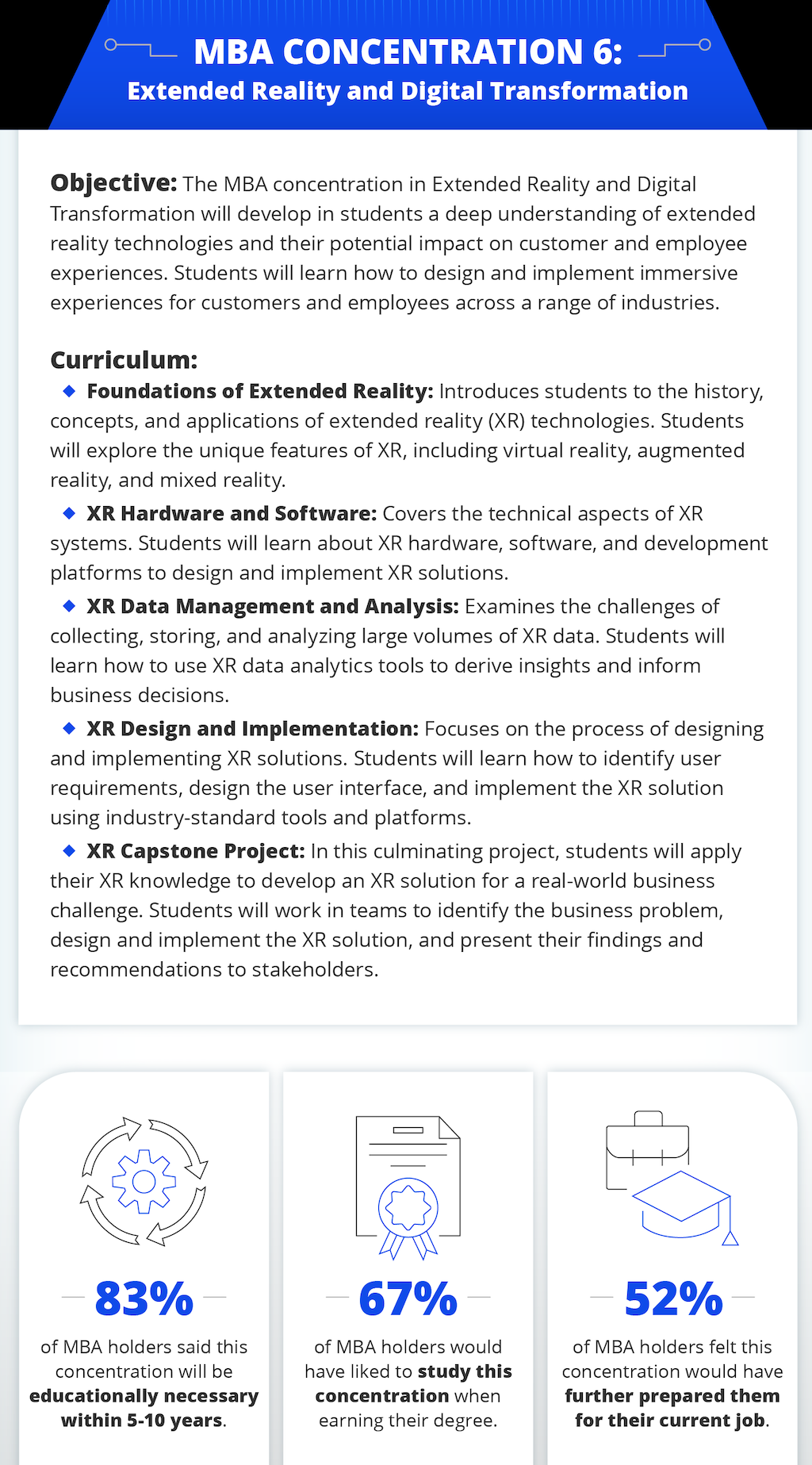
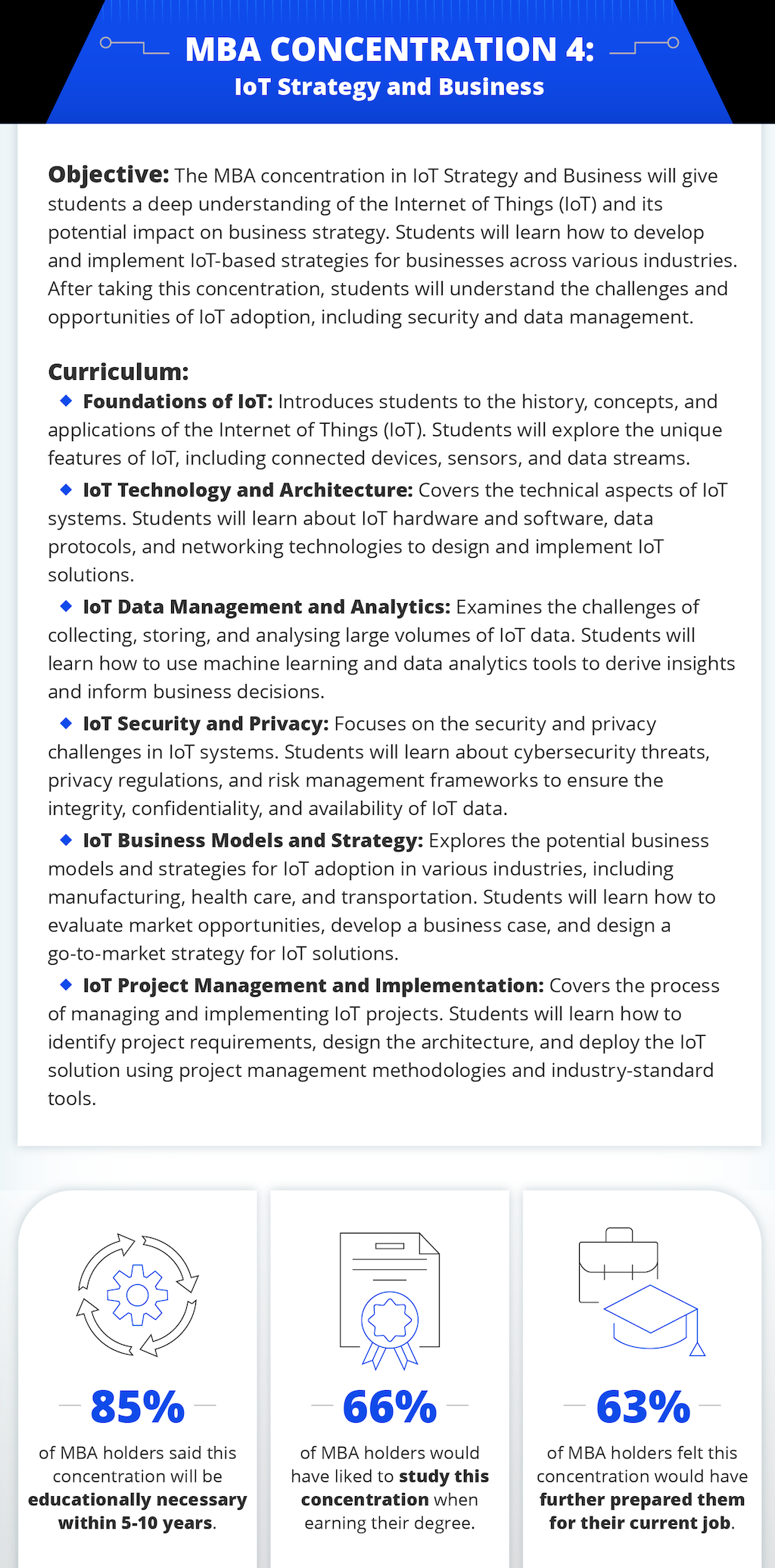
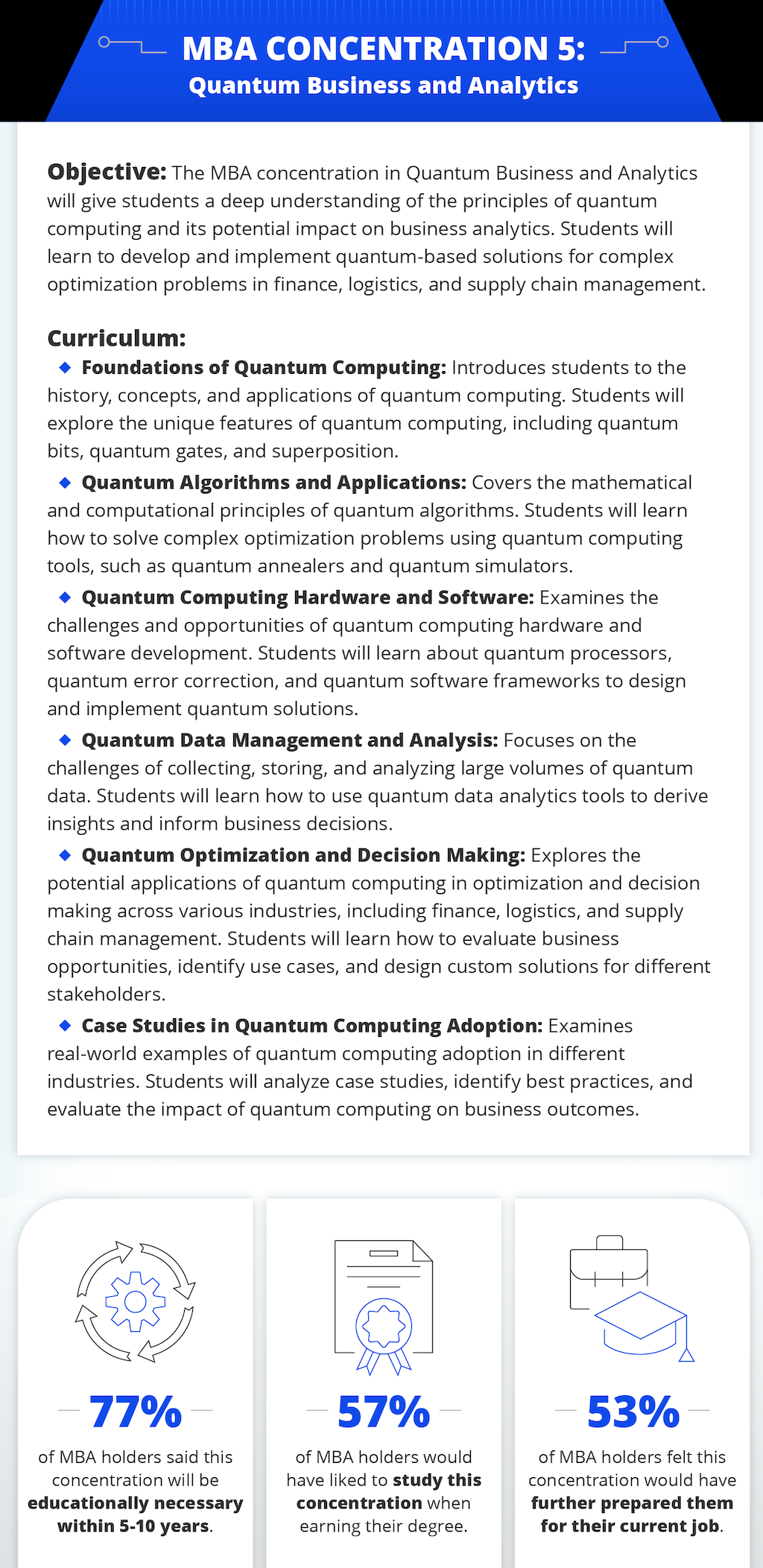
The MBA concentrations generated by ChatGPT proved to be relevant to today's workplace. They featured specialised curricula like leveraging ChatGPT for project management, implementing blockchain solutions across various industries, and understanding quantum computing's role in business analytics. These technology-focused, business-minded programs covered critical areas of concern for current companies and could make MBA graduates even more valuable in their professional fields.
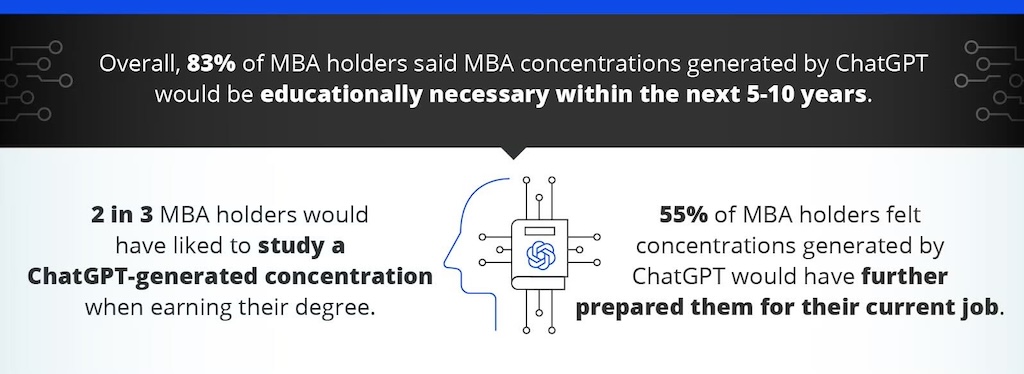
The MBA holders who reviewed the hypothetical concentrations were impressed. Without knowing they were AI-generated, 2 in 3 MBA holders said they wish they could have studied one of the concentrations when earning their degree, and over half (55%) said the concentrations would have further prepared them for their current job. Furthermore, 83% of MBA holders thought the concentrations generated by ChatGPT would be educationally necessary within the next five to 10 years.
Staying ahead of the curve
As MBA holders reviewed possible concentrations for future program enrollees, we asked them about their own educational goals and how they might advance their technological learning.
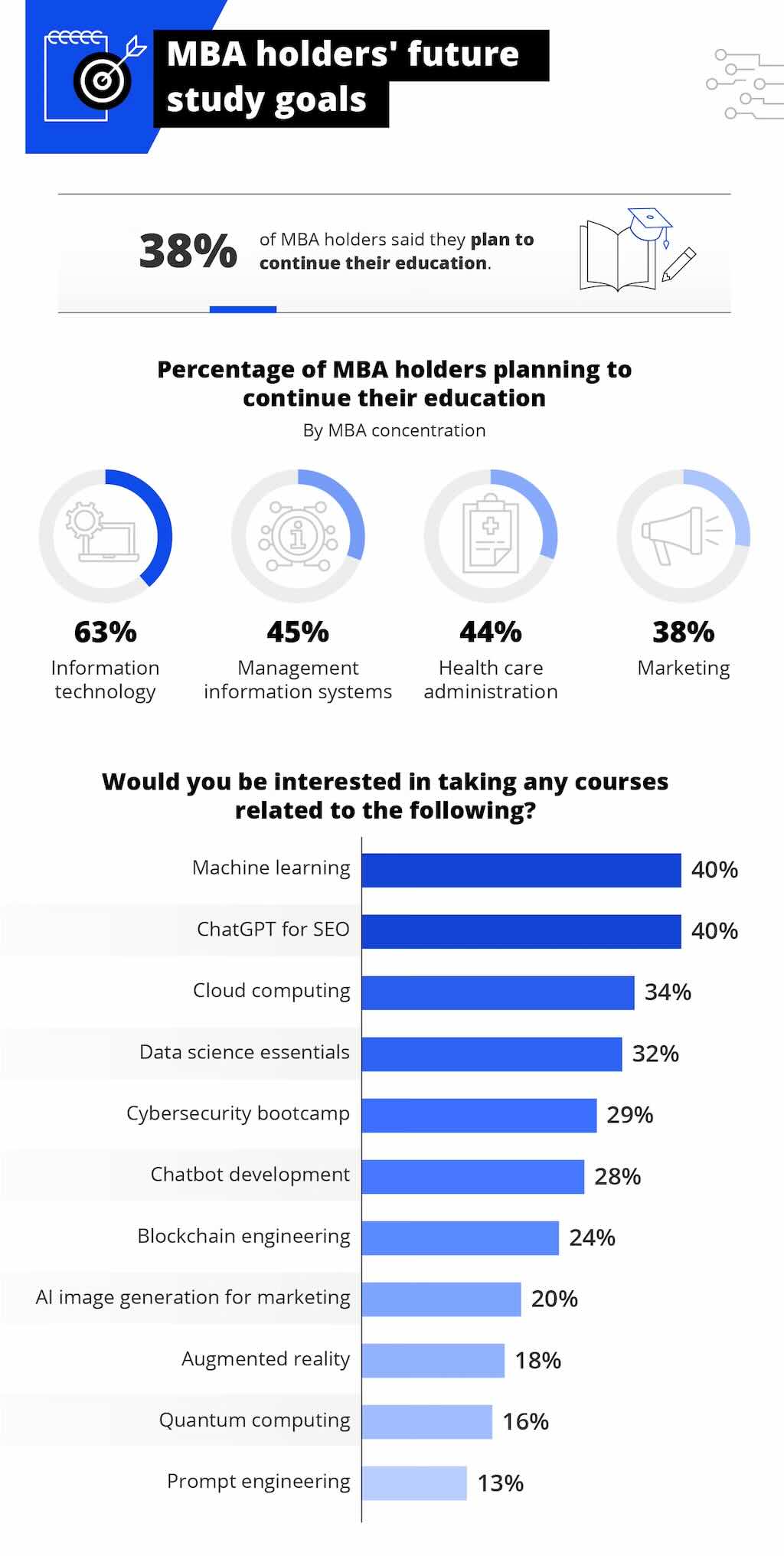
There's little doubt about the value of an MBA in today's marketplace, but rapidly changing technology demands ongoing education. Nearly four in 10 MBA holders planned to continue their education, 63% of whom studied information technology. They were most interested in taking courses related to machine learning (40%), ChatGPT for SEO (40%), and cloud computing (34%).
As MBA programs upgrade to adapt to the digital era and prepare graduates to take on rapidly evolving technologies, a Master of Business Administration can be vital to the future of business and help keep the workplace moving forward.
If you're interested in continuing your education and advancing your technological learning, University of Technology Sydney offers forward thinking courses related to machine learning, SEO, and cloud computing, as well as programs with Technology Management concentration.
The search for relevance
Emerging technologies like AI are upending the workplace, posing a challenge for MBA programs seeking to stay relevant. MBA programs of the future will need to include courses on emerging technologies and offer specialised concentrations in areas like AI language generation and quantum analytics. As MBA programs upgrade to adapt to the digital era and prepare graduates to take on rapidly evolving technologies, they could prove vital to the future of business and help keep the workplace moving forward.
Methodology
For this campaign, we gathered expert insights from MBA program professors, business school department workers, and emerging technologies experts. Additionally, we conducted online research to identify the latest trends in these fields. Using these insights, we prompted ChatGPT to generate MBA concentrations that align with the identified trends and objectives. To gauge the acceptability of these concentrations, we surveyed 501 MBA holders from the United States, Australia, and the United Kingdom and sought their opinions on the new MBA concentrations proposed by ChatGPT. To ensure unbiased feedback, we did not inform the respondents that the MBA concentrations were AI-generated.
Fair use statement
If you're interested in the future of business education, we invite you to share our findings for any noncommercial purpose. We ask that you provide a link back to this page so readers can access our full findings and methodology.





